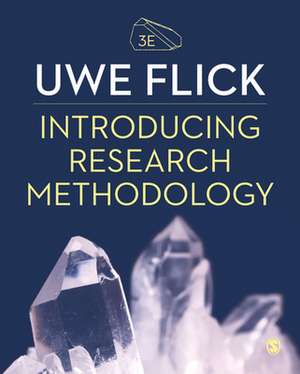Introducing Research Methodology: Thinking Your Way Through Your Research Project
Autor Uwe Flicken Limba Engleză Paperback – 23 mar 2020
Packed with examples showing the diversity of research, this third edition provides hands-on guidance to help:
- Develop key academic skills like critical thinking, effective writing and building an argument
- Confidently interpret findings, assess arguments and understand the wider impact of their research
- Understand the challenges and opportunities involved in working with new types of data like social media and online data
| Toate formatele și edițiile | Preț | Express |
|---|---|---|
| Paperback (1) | 345.47 lei 3-5 săpt. | +36.54 lei 7-13 zile |
| SAGE Publications – 23 mar 2020 | 345.47 lei 3-5 săpt. | +36.54 lei 7-13 zile |
| Hardback (1) | 905.11 lei 6-8 săpt. | |
| SAGE Publications – 23 mar 2020 | 905.11 lei 6-8 săpt. |
Preț: 345.47 lei
Nou
Puncte Express: 518
Preț estimativ în valută:
66.11€ • 72.03$ • 55.70£
66.11€ • 72.03$ • 55.70£
Carte disponibilă
Livrare economică 02-16 aprilie
Livrare express 19-25 martie pentru 46.53 lei
Preluare comenzi: 021 569.72.76
Specificații
ISBN-13: 9781526496935
ISBN-10: 1526496933
Pagini: 416
Dimensiuni: 186 x 232 x 30 mm
Greutate: 0.71 kg
Ediția:Third Edition
Editura: SAGE Publications
Colecția Sage Publications Ltd
Locul publicării:London, United Kingdom
ISBN-10: 1526496933
Pagini: 416
Dimensiuni: 186 x 232 x 30 mm
Greutate: 0.71 kg
Ediția:Third Edition
Editura: SAGE Publications
Colecția Sage Publications Ltd
Locul publicării:London, United Kingdom
Recenzii
A significant effort has been made to present a detailed, contemporary overview of designing and conducting social research. The author goes beyond the usual content covered in this type of textbook, by elaborating on worldview methodological approaches to research.
This continues to be a stand-out resource for students who are undertaking their first social research project, and this edition brings many welcome updates. Particularly welcome are the strengthening of the section on ethics, and the integration of online and digital research throughout the text.
This continues to be a stand-out resource for students who are undertaking their first social research project, and this edition brings many welcome updates. Particularly welcome are the strengthening of the section on ethics, and the integration of online and digital research throughout the text.
Cuprins
Part I: Orientation
Chapter 1: Why Social Research?
Chapter 2: Worldviews in Social Research
Chapter 3: Ethical Issues in Social Research
Chapter 4: From Research Idea to Research Question
Part II: Planning and Design
Chapter 5: Reading and Reviewing the Literature
Chapter 6: Steps in the Research Process
Chapter 7: Designing Social Research
Part III: Method Selection
Chapter 8: Deciding on Your Methods
Chapter 9: Triangulation and Mixed Methods
Part IV: Working with Data
Chapter 10: Using Existing Data
Chapter 11: Collecting Data
Chapter 12: Analyzing Data
Part V: Reflection and Writing
Chapter 13: What is Good Research? Evaluating Your Research Project
Chapter 14: Writing up Research and Using Results
Chapter 1: Why Social Research?
Chapter 2: Worldviews in Social Research
Chapter 3: Ethical Issues in Social Research
Chapter 4: From Research Idea to Research Question
Part II: Planning and Design
Chapter 5: Reading and Reviewing the Literature
Chapter 6: Steps in the Research Process
Chapter 7: Designing Social Research
Part III: Method Selection
Chapter 8: Deciding on Your Methods
Chapter 9: Triangulation and Mixed Methods
Part IV: Working with Data
Chapter 10: Using Existing Data
Chapter 11: Collecting Data
Chapter 12: Analyzing Data
Part V: Reflection and Writing
Chapter 13: What is Good Research? Evaluating Your Research Project
Chapter 14: Writing up Research and Using Results
Notă biografică
Uwe Flick is Senior Professor of Qualitative Research in Social Science and Education at the Freie Universität Berlin, Germany. He is a trained psychologist and sociologist and received his PhD from the Freie Universität Berlin in 1988 and his Habilitation from the Technical University Berlin in 1994. He has been Professor of Qualitative Research at Alice Salomon University of Applied Sciences in Berlin, Germany and at the University of Vienna, Austria. Previously, he was Adjunct Professor at the Memorial University of Newfoundland in St. John¿s, Canada; a Lecturer in research methodology at the Free University of Berlin; a Reader and Assistant Professor in qualitative methods and evaluation at the Technical University of Berlin; and Associate Professor and Head of the Department of Medical Sociology at the Hannover Medical School. He has held visiting appointments at the London School of Economics, the Ecole des Hautes Etudes en Sciences Sociales in Paris, Cambridge University (UK), Memorial University of St John¿s (Canada), University of Lisbon (Portugal), Institute of Higher Studies in Vienna, in Italy and Sweden, and the School of Psychology at Massey University, Auckland (New Zealand). His main research interests are qualitative methods, social representations in the fields of individual and public health, vulnerability in fields like youth homelessness or (forced) migration. He is the editor of The SAGE Handbook of Qualitative Data Analysis (Sage, 2014), The SAGE Qualitative Research Kit (Sage, 2nd edn, 2018), A Companion to Qualitative Research (Sage, 2004), Psychology of the Social (Cambridge University Press, 1998). His most recent publications areDoing Grounded Theory (Sage, 2018), Doing Triangulation and Mixed Methods (Sage, 2018), The SAGE Handbook of Qualitative Data Collection (editor, Sage, 2018), the third edition of Introducing Research Methodology ¿ Thinking Your Way through Your Research Project (Sage, 2020) and Doing Interview Research - The Essential How To Guide (Sage 2021), The SAGE Handbook of Qualitative Research Design(editor, Sage, 2022), and the seventh edition of An Introduction to Qualitative Research(Sage, 2022). In 2019, Uwe Flick received the Lifetime Award in Qualitative Inquiry at the 15th International Congress of Qualitative Inquiry.
Descriere
An encyclopedic introduction to research, showing students how to think about every stage of their project and equipping them with the tools they need to understand different research processes.
